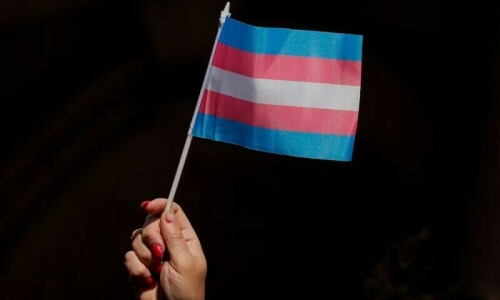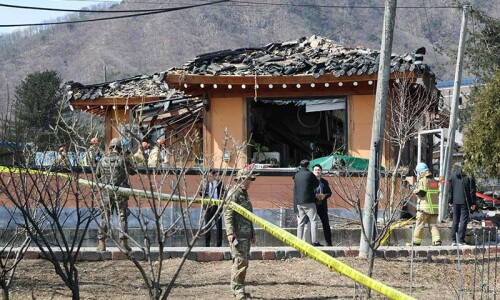For decades, Iraq’s landscape was dotted with heroic portraits of Saddam Hussein: he appeared as a Bedouin riding a white horse, a revolutionary in a black beret, or a devout Muslim with his head bowed in prayer.
But the most iconic image, which hung on buildings, schools, airports and highways, was that of a smiling Hussein, wearing a fedora and firing an assault rifle into the air.
In the more than 30 years he ruled Iraq, Hussein tirelessly cultivated the persona that photograph embodied: an urbane, modern and, above all, strong leader.
Hussein was executed nine years ago — on December 30, 2006 — but he remains an important symbol for Iraq’s disillusioned Sunni Arab minority.

His legacy as a supposedly strong leader who kept Iraq together, by brutal force, reverberates for Sunnis in the wider Middle East, which is wracked by sectarian conflict and stalled revolutions.
Today, Hussein leaves a new legacy in Iraq: a marriage of convenience between former officers of his Baath Party and Sunni militants like those of the militant Islamic State (IS) group.
The militants assumed the most prominent role as they swept through northern and central Iraq in mid- to late-2014. But they were able to capture large swaths of territory from the Iraqi government thanks to an alliance with a network of former Hussein regime loyalists who had deep ties to Sunni tribes in cities like Mosul and Tikrit.
After taking control of Mosul and other Sunni cities, IS leaders pushed aside the ex-Baathists or absorbed them into the group’s ranks.
The ex-Baathists, who include former intelligence officers and elite Republican Guard troops, coalesced in 2007 — soon after the Shia-led government in Baghdad executed Hussein — as a group called the Men of the Army of the Naqshbandi Order.
The group’s leader is Ezzat al-Douri, who was Hussein’s right-hand man and the most wanted member of the ousted Baathist regime to remain at large since the United States (US) invasion of Iraq in 2003.
The Naqshbandi Order sought to counter Iranian influence, tap into the disillusionment of Iraq’s Sunni community and try to restore Sunni rule over the country.
Soon after IS militants captured Mosul in June 2014, with help from the Naqshbandi Order and its tribal allies, Douri issued an audio message praising the Sunni militants and urging Iraqis to join the fight.
"Join the ranks of the rebels who liberated half the country," he said. "The liberation of Baghdad is around the corner. Everyone should contribute to complete the liberation of the beloved country, because there is no honour or dignity without it."
Read: The volatile fusion: Origins, rise & demise of the ‘Islamic Left’
In April, Iraqi militia fighters paraded a body — purportedly that of Douri — in a glass coffin through the streets of Baghdad. But DNA tests could not confirm that the body was indeed Douri’s, and he had been erroneously reported by Iraqi officials as killed or captured several times in the past. Douri is likely still at large, and working with Sunni militants.
A recent Reuters investigation revealed that former Iraqi Baathists are playing a leading role in Islamic State, especially as leaders of its shadowy military and security apparatuses.
Because the Baathists have deep social, financial and cultural ties to many areas that are now under IS control, it will be difficult for the Iraqi government to dislodge the militants from those areas.
And even when Baghdad is able to recapture territory, the militants and their Baathist allies undermine the central government’s efforts to restore order.
In 2003, Hussein became the first modern Arab leader to be deposed by a foreign power.
After a trial marred by charges of US interference and procedural flaws, an Iraqi court convicted him of crimes against humanity and sentenced to death by hanging. That earned Hussein another distinction: as the first modern Arab ruler to be tried and executed for his crimes.
Hussein’s execution became a rallying cry for his supporters and for Sunnis in the region.
On December 30, 2006, Hussein stood calmly at the gallows, as one of his three executioners — men in black ski masks and leather jackets — prepared to slip a thick yellow noose around his neck. Hussein stepped toward the platform that would soon open up beneath him.Then, the room erupted in Shia religious chants and taunts. The Shia guards and activists seized the moment to confront a dictator who had inflicted so much suffering on the Shia of Iraq.

Several men shouted, "Muqtada, Muqtada, Muqtada," referring to the Shia cleric Muqtada al-Sadr, who led a rebellion against US troops in Iraq.
"Muqtada," Hussein smiled, and asked sarcastically: "Is this your manhood?"
"Go to hell," one man yelled.
An Iraqi prosecutor pleaded with the hecklers, "I beg you. The man is facing execution. Please stop."
The room quieted briefly, and Hussein was hanged.
Hussein’s execution cemented his status as a Sunni and Arab nationalist martyr.
While not all Sunnis in the region were necessarily fond of the deposed Iraqi leader, many were outraged at the way he was executed.
This was a low point in relations between Sunnis and Shias, and the US-backed Iraqi government made a series of miscalculations that gave Sunnis throughout the Arab world a new reason to hold a grudge against Shias.
After Hussein’s execution, the ex-Baathists became more active through the Naqshbandi Order and they enhanced their alliance with militants of Al Qaeda in Iraq, which would later morph into IS.
Several top Baathist officials, including Douri, went into hiding and began to mastermind the Sunni-led insurgency soon after US forces ousted Hussein’s regime.
In the fall of 2003, American officials said Douri was involved in recruiting foreign militants and funding attacks on US troops.
That assessment was based on accounts from captured members of Ansar al-Islam, an Al Qaeda-linked group that US officials blamed for a series of suicide bombings and other attacks on American forces and Iraqi civilians.
US officials said Douri and other ex-Baathist leaders fled to neighbouring Syria, where they reportedly worked with Syrian intelligence operatives to re-establish elements of the Baath Party within Iraq.
Both the Baathists and militants were able to cultivate support from ordinary Sunnis who were alienated by the sectarian policies of former Iraqi Prime Minister Nouri al-Maliki.
Since the new premier Haider al-Abadi, took office in September 2014, Sunni political leaders have made several demands on him.
These include amnesty for tens of thousands of Sunnis imprisoned — in many cases without judicial review — by Maliki’s regime in the name of fighting terrorism; greater power in the new government; an end to aerial bombardment of Sunni towns; and a more significant role in the Iraqi security forces, which Maliki cleansed of many senior Sunni officers.
Also read: Sectarianism in Iraq — is Pakistan watching?

Today, Shia militias are taking the lead in the fight against IS and other militants, and in the process further alienating the Sunni community.
Many Sunnis cringe at the memories evoked by the reestablishment of Shia militias, which carried out widespread kidnappings, torture and killing of Sunnis during the sectarian war that raged in Iraq from 2005 through 2008.
Hussein’s legacy will continue to haunt Iraq as long as Sunni grievances are unresolved, and the country’s new Shia rulers resist sharing power with the Sunni Arab minority.
Abadi must assure Iraq’s Sunnis that he will be able to reverse the legacy of his divisive predecessor.
At the same time, Sunnis need to move beyond pining for the glory days of Hussein and his brutal Baathist regime — a regime that set Iraq on a path of destruction.
















































